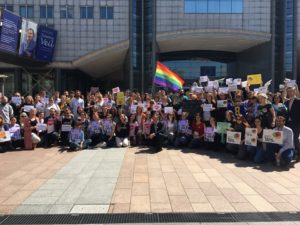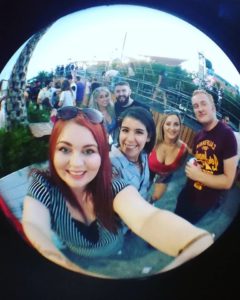In the latest of our Northern Roots series, where we speak to people originally from Northern Ireland but currently living elsewhere – or vice versa – our interviewee is Emma Rainey, from west Belfast now in Brussels. You can follow Emma on Twitter @Afootin2places.
1) Tell us about yourself. When did you leave Northern Ireland, and where did you go? What do you do now?
I left home in 2011 for a number of different reasons. Growing up in west Belfast, I always had this sense of urgency that I needed to ‘get out’, that the repetitive nature of political and social life in Northern Ireland was going to suffocate any chances I had of reaching my personal and professional goals. In my second year at studying criminology at QUB, I began making plans to go on Erasmus in my third year. The initial destination was intended to be Barcelona but one girl’s weekend away in Rome turned that all upside down. I met a Flemish boy at a pub crawl (the Highlander Pub) and after committing to a long-distance relationship for a year, I decided to go to Brussels on Erasmus instead.
Fast-forward to 2018 and I’m still here with him. Whilst living here, I’ve taken advantage of the affordable higher education programmes that Belgium has to offer and completed my MSc in Criminology at KU Leuven. After completing numerous unpaid internships whilst bar-tending in the local Irish pubs, I eventually fell into project and campaign management within the non-profit sector, working in the areas of child protection, gender equality and development. In true Brussels fashion, long-term contracts are few and far between, so at present I’m an outsourced consultant for the European Commission where I monitor EU-funded projects in Africa. I’m also currently studying an online part-time Masters in Communications for Development at Malmö University in Sweden.
In my spare time, I’m involved in Brussels Repeal where we campaign for reproductive rights for the island of Ireland. I’m also a member of Young Feminist Europe, mainly working on the social media side of things for the platform.
2) What do you think when you see the Northern Ireland of today, in the news and on social media?
As someone who enjoys politics, activism and finds media discourses interesting, I’m quite active on Twitter and it’s very much a way for me to stay connected to home. A few years ago, my image of Northern Ireland looking from the outside in was one of hope. I was eager to see us transform into a progressive society, one that was being built on forging better community relations, as well as social and economic investment. Grassroots organisations and some political parties were genuinely invested in the idea of a shared society, and it was lovely to see it evolve into something that could take root.
However, the political and social climate we’re currently in post-Brexit, especially since the collapse of the assembly, has completely soured that image. The insular tribal nature of Northern Ireland seems to be prevailing again.
When I tell people I’m from Northern Ireland, the reaction I get is usually one of the following:
- Surprise because I’m probably the first person they’ve met from the region and they would love to know how I came to be in the EU capital;
- Awe followed by a tonne of questions regarding the Troubles because these folks tend to be fellow left-wingers and find social conflicts interesting;
- Uncertainty because they’ve heard bad things about Northern Ireland and they’re not sure how to approach me.
I think that paints a picture of how we’re perceived within the Euro bubble.

3) Are you hopeful for Northern Ireland’s future? Will Brexit make a difference?
As I live in Brussels, it can be assumed from the readers that I’m a bit of a Europhile, so everything about Brexit offends my core beliefs. As being part of the Erasmus generation, I availed of the wonderful programme that not only provided me with financial support but also the opportunity to expand my world view. It genuinely saddens me that this could be taken away from other young people from Northern Ireland.
Freedom of movement has also been the cornerstone of much of my adult life, therefore, travelling back home has always a doddle and it enables me to live here in Brussels. I’ve always had an Irish passport; therefore, being able to travel around the EU post-Brexit should still be easy enough but I’m fearful about how the experience travelling home will be. Unless the UK stays in the customs union and/or the ‘backstop’ for the border is guaranteed, I think it will have dire consequences for the region in multiple ways both economically and socially.
I don’t think I could ever forgive the DUP or the Tories for putting the people of Northern Ireland through this hell, especially against our own will. Ignorant politicians from outside of NI are one thing but the DUP should have known better. Rather than put the interests of the region and the people they’re supposed to represent first, they’ve prioritised party interests for short-term financial and political leverage.
In short, I’m not hopeful. Any ounce of hope I had pre-Brexit was a smoke screen. Brexit just revealed the many layers of problems that Northern Ireland has. First being that we have no real agency within the wider UK – England will always dictate how things are for the rest of us. Our reliance on handouts from Westminster means we’ll always depend on them, meaning that there is no real incentive to make Northern Ireland work economically. Our social and political structures only seem to sustain a cycle of crisis. It’s a sad existence. No wonder we’ve a brain drain.
4) Do you think you will return to Northern Ireland? What could convince you to come back?
I planned to return pre-Brexit. The idea was to move back home before 2019, find work and invest in some property but Brexit has put a halt to that plan. The main reason is that my partner is Belgian and as an EU national his status would perhaps never be fully secured. I don’t want to risk our future on a gamble of certainty.
Radical structural and social change is probably the only thing that could entice me to come home. If Brexit was cancelled tomorrow and the Assembly was back up and running, it still wouldn’t be enough for me at this point. I wouldn’t be content with reverting back to the status-quo.
It’s very easy for me to pontificate about Northern Ireland whilst I don’t live there anymore but I do have a vested interest to see it not just do better but to actually thrive into something that resembles a normal society. I would like to come home as I miss my family, but I just don’t think it’s possible under the current conditions.

5) What can Northern Ireland learn from the place you live now?
Belgium in many ways has similarities to Northern Ireland, but obviously not as extreme. The divisions here are more of a linguistic and cultural nature mainly between the Flemish (Dutch dialect) and Walloons (French speaking). Despite some minor tensions over the years, they’ve made it work and the federalised state seems to flourish despite the bureaucratic chaos. Belgians overall tend to be a very pragmatic people and look at the bigger picture when analysing anything.
Brussels is a world apart within Belgium though – it is multicultural and exciting. People from all walks of life have made the city their home. People here have developed an acceptance for the strange and unfamiliar which is a characteristic that would do Northern Ireland a world of good.
Brussels is also filled with idealists, social justice advocates, the ambitious and people who have a hunger for life. Basic traits that tend to stem from these, such as empathy, radical kindness and knowing your self-worth would really transform the social and political life of Northern Ireland.
6) If Northern Ireland had a president with sweeping powers, and it was you, what would you do?
For starters, I’d legislate for same-sex marriage, abortion reform, Irish language rights, a bill of rights, legacy justice rights, the criminalisation of misogyny, update child protection laws including those for FGM. I would also legalise cannabis and lower the voting age.
I would provide mental health services with the resources they need and I would ensure integrated education is actually implemented. I’m a big fan of civic society organisations but I believe that distinctions and classifications needs to be reformed in Northern Ireland. Extensive funding opportunities would be provided to NGOs and charities that have a proven track record or viable plans to create meaningful social impact.
I would stop Universal Credits and PIPs, and install a welfare system that genuinely supports people. Hate speech and hate crimes would also be taken very seriously under my presidency. The area of the Cathedral Quarter would be given protected status and would be re-developed according to the wishes of the community. I’d overhaul infrastructure in the entire region, meaning the western counties will no longer be overlooked.
As an act to implement greater cross-community relations, both North and South, I would declare an ‘Ulster Week’ at the end of August – a festival encompassing all nine counties of the province, highlighting the distinct and shared cultures we have.
Lastly, I don’t know how much power I would have constitutionally as President but I would assume that there wouldn’t be a need for a useless Secretary of State for Northern Ireland, therefore, if my powers permit it, I would call a border poll. In the light of this border poll, an election watchdog would be set-up to ensure that all campaigns abide by the rules with the greatest amount of transparency possible.
Should a United Ireland come to pass, I’d re-run again for Presidency just for one more term.
7) What would you like to see more of on Northern Slant?
Maybe more pieces highlighting the work of grassroots activists and those from the arts and cultural sectors. I particularly like these ‘Northern Roots’ pieces too.
8) If you could ask three Northern Ireland politicians (past or present) to dinner, who would they be? And why?
Bernadette (Devlin) McAliskey is such an inspirational person and a complete badass. I think I could sit and talk with her for hours about feminism, socialism and global affairs. I’d wish she would return to the political arena as I think she would be a much needed breath of fresh air in these times but I understand her reasoning for not. It’s up to our generation now to sort things out.
Martina Anderson MEP would be another at the table. Even though I wouldn’t be a typical supporter of Sinn Féin, I appreciate the hard graft she’s put into the European Parliament by ensuring our voices on Brexit are heard and for advocating for some form of special status for the North. DUP MP Sammy Wilson referred to her as a ‘fishwife’ when she gave a speech on Brexit and the border but I saw a passionate Ulster woman expressing the true feelings of the greater community.
It’s difficult to choose just one from the former NI Women’s Coalition because I feel as though they’ve been entirely overlooked within the peace process and for wanting to bring women’s voices to the table. I’m going to break the rules and invite both Monica McWilliams and Jane Morrice.

9) Do you have a favourite quote, or mantra?
“Yesterday I dared to struggle. Today, I dare to win.” Bernadette Devlin.
10) What’s your message for people back home?
Political apathy is no longer a privilege we can afford. So, wake up and get the marching boots on, and don’t just demand a better future, demand a better present.
Also published on Medium.
